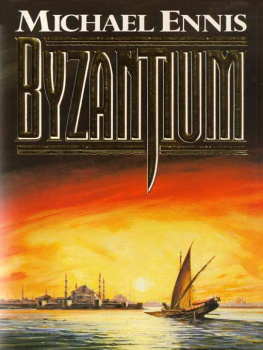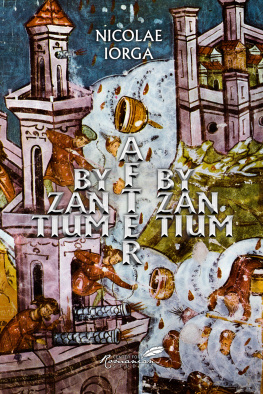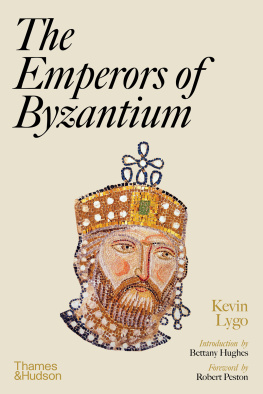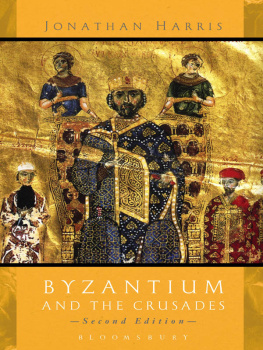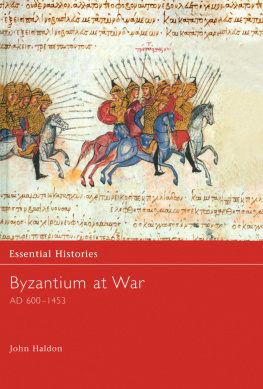Michael Ennis - Byzantium
Here you can read online Michael Ennis - Byzantium full text of the book (entire story) in english for free. Download pdf and epub, get meaning, cover and reviews about this ebook. year: 1989, publisher: Atlantic Monthly Pr, genre: Detective and thriller. Description of the work, (preface) as well as reviews are available. Best literature library LitArk.com created for fans of good reading and offers a wide selection of genres:
Romance novel
Science fiction
Adventure
Detective
Science
History
Home and family
Prose
Art
Politics
Computer
Non-fiction
Religion
Business
Children
Humor
Choose a favorite category and find really read worthwhile books. Enjoy immersion in the world of imagination, feel the emotions of the characters or learn something new for yourself, make an fascinating discovery.
- Book:Byzantium
- Author:
- Publisher:Atlantic Monthly Pr
- Genre:
- Year:1989
- Rating:3 / 5
- Favourites:Add to favourites
- Your mark:
- 60
- 1
- 2
- 3
- 4
- 5
Byzantium: summary, description and annotation
We offer to read an annotation, description, summary or preface (depends on what the author of the book "Byzantium" wrote himself). If you haven't found the necessary information about the book — write in the comments, we will try to find it.
Byzantium — read online for free the complete book (whole text) full work
Below is the text of the book, divided by pages. System saving the place of the last page read, allows you to conveniently read the book "Byzantium" online for free, without having to search again every time where you left off. Put a bookmark, and you can go to the page where you finished reading at any time.
Font size:
Interval:
Bookmark:
The world was a reflection in a copper sheet. The dust stirred by the horses hooves swirled up into the dust already suspended in the air like a dry, chalk-fine fog. The approaching horses of the scouts merely added to the choking ochre cloud.
The scouts, dark, wild-eyed men called akrites, wore jerkins of quilted cotton over short linen tunics. There were four of them, silver helmets dulled to brass in the dusty pall. They rode directly to the Domestic of the Imperial Excubitores, bowed in their saddles, and began talking with animated gestures. Haraldr had difficulty with the dialect - the akrites were from Armenikoi, a theme half-way to Khoresm - but he understood. A Saracen raiding party, fair-sized, was just ahead.
It appears that the Saracens have positioned themselves to block the Cilician Gates, came the quick, effortless translation.
Haraldr pushed his helmet back, wiped the grit from his forehead, and smiled at Gregory Zigabenus, the interpreter who had accompanied the Rus trade fleet. I understood some of that already, Gregory. Then he said in Greek, Because you... teach well. He added his own silent thanks to Odin and Kristr for this gift of the little eunuch. The assignment apparently had been by chance, but the adventuresome, unfailingly cheerful Gregory was as welcome as a third hand in a single combat. Like every Roman, Gregory was mute on the subject of the Emperor and his immediate circle, but otherwise he had been a continuing education in what Joannes had called the shoals of the Roman system. And strange waters - not to mention dangerous - they were indeed.
Haraldr looked down the road up which he had just ridden, along with two dozen horsemen of the Imperial Excubitores. The graded path, here only wide enough to draw a wagon through, wound down through the russet haze towards a dull, brownish-grey plateau ringed by the slightly darker convolutions of the Taurus Mountains as they rose to their snow-crested heights. He had never imagined so much land, or so little beauty. And yet the mute austerity of the terrain bespoke the power of the Romans. For almost six weeks, at a clip that surely measured at least two and sometimes three rowing-spells a day, the Imperial entourage had traversed territory not unlike this. Not as dusty, certainly; farther to the north the peaks were less precipitous and the pastures still held some of summers verdure. But the distances, the isolation on many stretches, surpassed anything imaginable even on Norways barren central plateau. Yet, most remarkably, just when one thought that the Romans had finally run out of folk with which to populate this prodigious domain of theirs, the endless road (paved as neatly and much more sturdily than the floor of a Jarls hall) would enter the tree-rimmed perimeter of yet another pasture; pass through the rich, dark, relentlessly cultivated communal fields and orchards speckled with ripe fruit; and lead them to the clustered mud-brick, thatch-roofed huts of yet another Roman village. The industry of these provincial Romans, lost in this frightening vastness, was something to behold; hoeing their autumn harvest of vegetables, chopping wood for winter, sacking grain, bundling fodder, driving their massive oxen to and fro, they had coaxed a bounty from a wasteland that a Norse farmer wouldnt give a piece of silver the size of his fingernail for. And yet, as Gregory had explained, many of these proud, busy people preferred to become rich mens slaves because of the burden of Imperial taxes on free peasants.
The Domestic wonders if you wish to go forward with them. He says if you do, you will see a Roman ambush.
Haraldr turned to Nicon Blymmedes, Domestic of the Imperial Excubitores: thick-chested, wiry-limbed, about two score years old. Blymmedes was accompanied by two dozen mounted soldiers wearing waist-length mail shirts and conical helms, with their bows and tooled-leather arrow quivers slung over their backs. The rest of their vanda, a company of about two hundred strong, were footmen who had disappeared up ahead, seemingly swallowed by tortured rock and swirling dust clouds.
Yes, thank you, I will, said Haraldr directly to the Domestic. He had come to like the hawk-nosed, constantly frowning Blymmedes. The Domestic, unlike so many of these endlessly scheming Romans, seemed solely concerned with doing his own job properly - no, perfectly - and seeing that his subordinates performed with similar punctiliousness. Yet he was eager to teach, and he had accepted Haraldr as a fellow warrior with perhaps a different philosophy of warfare but of considerable aptitude in martial affairs.
The small contingent started up the steeply climbing roadway. Blymmedes fell back between Haraldr and Gregory and began another of his tactical discourses, vigorously illustrated with his leather-tough hands. You see, I have sent my infantry up ahead - Blymmedes thrust both his hands forward as Gregory translated - and positioned them in the heights on either side of the road. He pushed his hands apart to show the dispersal. Now we will come forward past the position of our hidden infantry. We will appear to be a mere scouting party, but one that offers the prize of a foolish officer of the Roman Imperial Taghmata. The Saracens will see us and advance quickly to profit from my impudence. Prudently we will retreat the way we have come. They will follow us, lusty with the promise of my ransom. When our pell-mell retreat has lured the Saracens beneath the positions held by my infantry... Blymmedes brought his hands together with a loud clap.
Deal with the enemy on your terms, said Haraldr directly, repeating one of Blymmedess axioms.
Yes, said the Domestic, hazel eyes flashing eagerly. Then he shook his finger. But meet the enemy. The ambush does not work if you simply run away. Retreat alone cannot win victory.
Gregory pretended to translate. You understood? I thought so. The Domestic, I think, feels that Roman strategy has become too cautious under the man who commands him. This is as far as he can go in criticizing the Grand Domestic Bardas Dalassena, however.
Blymmedes was now occupied ahead, having taken the point of the column. He signalled to his unseen forces in the hills. The road continued to climb and narrow, the crumbling, shard-strewn rock walls rising ever more steeply. They rounded a blind turn and looked up to a narrow defile backed by nothing but thin coppery sky. Blymmedes fell back for a moment and whispered to Gregory, then went boldly up ahead.
These are the Cilician Gates, whispered Gregory. The Domestic wanted you to know that Alexander brought his army through this pass.
Haraldr nodded. Alexander of Macedon, or the Great Alexander, had been a Greek King who had conquered the world to the Gates of Dionysus in the days before the Roman Empire even existed. Alexander sounded more like a god than a man, but the Domestic often referred to his tactics and courage and seemed very proud to speak the same language as this great demigod.
The horsemen wandered slowly into the massive jaws of the Cilician Gates. Haraldr caught a breathtaking glimpse of rugged terrain falling away to a dull green plain.
The Saracens seemed to come out of the rocks. They led their horses by the reins, then saddled up deliberately, as if they had enough time to pause and straighten the quills of their arrows. A few bright curved blades began to flash, and bows rose in disjointed arabesques against the metalled sky. The Domestic, conspicuously displaying himself four ells in front of the rest of his horsemen, held his reins deftly, almost as if he were preparing to touch a womans face. Horses snorted, but no one on either side made a sound. Then the nearest Saracen, a beetle-brown face with a coal-black beard and eyes rimmed with glaring whites, raised his arms and legs like a four-winged bird preparing to fly. Arrows hissed from quivers.
Font size:
Interval:
Bookmark:
Similar books «Byzantium»
Look at similar books to Byzantium. We have selected literature similar in name and meaning in the hope of providing readers with more options to find new, interesting, not yet read works.
Discussion, reviews of the book Byzantium and just readers' own opinions. Leave your comments, write what you think about the work, its meaning or the main characters. Specify what exactly you liked and what you didn't like, and why you think so.

